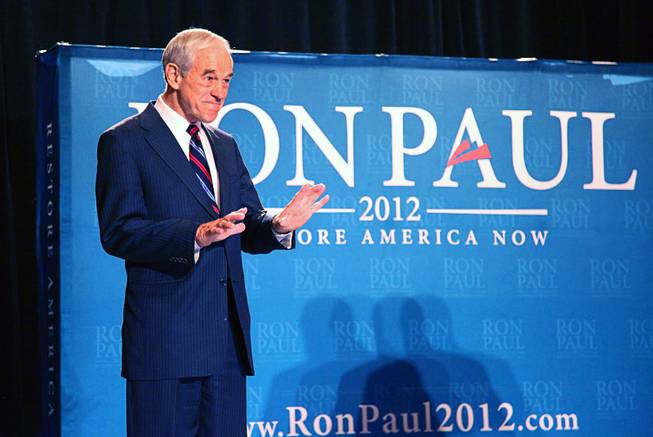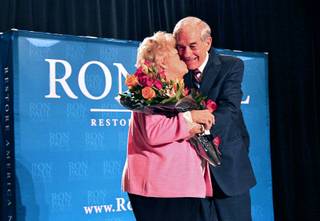
Republican presidential candidate U.S. Rep. Ron Paul, R-Texas, gestures for the audience to settle down after taking the stage during a campaign event at the Four Seasons Las Vegas on Wednesday, Feb. 1, 2012.
Thursday, Feb. 2, 2012 | 2 a.m.
Sun coverage
Nevada’s no stranger to major economic announcements: Presidential candidate Mitt Romney launched his jobs plan here, and President Barack Obama came twice in the past few months to pitch the nation on his plans to correct the housing market and jump-start the national energy industries.
But no national candidate has yet come to Nevada peddling a proposal targeted specifically to Nevada’s woes, which — agree with the specifics or not — is what Ron Paul tried to do Wednesday.
“I’ve been criticized because I sound more like an economics professor than a politician,” Paul began, speaking to a crowd of invited supporters and press at the Four Seasons Hotel in Las Vegas as he formally relaunched the economic plan he put out in October with a Nevada twist. “But if you have an economic problem and you turn it over to a politician, what’s the expectation that politicians are going to solve the problem by being politicians rather than thinking in economic terms?”
Paul’s opening rhetoric is much like his economic plans: dense and long-winded, but ultimately resulting in a digestible flourish that his die-hard fans appreciate with the kind of fervor reserved for punk rockers, not skinny 76-year-old statesmen.
Some of Ron Paul’s plans, packaged though they were for Nevada, weren’t particularly focused on the local economy. The proposal, “To restore Nevada’s job market,” according to the executive summary of his plan, runs the gamut from repealing Sarbanes-Oxley — which set standards for the boards of public companies — to instituting a national right-to-work law (Nevada is already a right-to-work state).
But on other issues, he seemed to be speaking directly to the problems of the local audience.
“This is a city that could benefit rather quickly from one little proposal: Make sure that the United States government does not tax tips at all,” Paul said, adding later that he would not support just raising the minimum wage instead — to thunderous shouts of approval and applause.
The crowd roared just as strongly to Paul’s Vegas-pitch on tourism.
“We’ve overreacted to the visitation privileges of foreigners coming to our country,” he said. “We want people to come to our country , they’re rich, they could be spending their money here in Las Vegas — that’s a good idea.”
Paul later added that he did not support efforts to promote American tourism abroad, even though Congress passed a bipartisan tourism promotion bill last Congress that the entire Nevada delegation supported.
“I don’t think that’s the responsibility of one group of taxpayers to support the other ones. Which ones are you going to support and why would you transfer the money?” Paul said. “I think we need to get out of the way and get the hindrance of these visas and the disapproval that we have with the TSA — people don’t just like to go through it.”
Paul’s son, Rand Paul, was recently detained by the TSA at National Airport in Washington, D.C.; he has since questioned if the machines can be rigged to arbitrarily be set off by people posing no threat.
Paul’s plan delved into more sweeping matters of policy as well.
On housing, Paul promised an extension of the first-time homebuyer tax credit, the introduction of a tax credit for those contending with foreclosure and a “capital loss deduction” for anyone who sells their home for less than they paid for it, and ending all taxes on savings — to make it easier for people to save for a home they can actually afford.
“We have not allowed the liquidation of debt. Instead the debt has been transferred to us, to the people, and under those circumstances, you can’t expect a recovery,” he said. “I say we remove the effort to bail out and give the people a tax benefit if they do work something out — even if it’s a lot of money, give it to them over five years … this would be a boost to the effort to wind this down.”
On federal lands, he advocated a return of property to the states in the context of another passion-fanning parochial issue: Yucca Mountain.
“Forty-nine states decided that Nevada should be a dump for nuclear waste. I strongly oppose that and have always voted against that,” Paul said. “Matter of fact, I’d like to see as much federal land as possible returned to the states, who should be in charge of it.”
(Earlier in the day, Paul went further, musing to a reporter that if federal land were fully privatized, there might be some in Nevada that could host a Yucca-style project.)
There’s a common theme in all of these proposals: Tax credits, good; paying for things, bad.
“We cannot correct this until we admit the truth: We spent too much money, we’re too much in debt, and we ought to cut spending, a lot of it,” Paul said, adding: “Giving people back their own money, that is not a contribution to the debt. The debt is created by spending too much money.”
It’s a recitation almost verbatim of the position congressional Republicans (that is his day job after all) have taken to the issue of deficit reduction — and why they oppose Democrats’ efforts to get the very rich to pay slightly more in taxes to help balance the budget.
Paul ends up tailoring his message of economic salvation to those who make enough money to claim the tax credits he’s proposing. But Paul says the general climate of what he’s proposing will eventually reach the very poor.
“If we truly care about the poor people, we will care about freedom,” he said Tuesday in response to a question.
That may seem a rather political answer for the candidate who claims to be more akin to an economics PhD. But if it feels a little nebulous to those struggling with an underwater mortgage or an employment market that’s too rife with job seekers to find a position, don’t worry — Paul’s got a crowd-pleasing, dismissively professorial answer for that: You need to understand the economy as clearly as he does.
“If we’re going to see a revival of our economy, we have to see a clear understanding of monetary policy, property rights, contract rights, give up this confidence that the government is our salvation, that we believe that they can make sure everybody has a house,” he said. “We have to understand that if we’re true humanitarians and care about the wealth and the prosperity of the middle class, we have to give up on the idea that the government is responsible and can do anything about it. Only freedom can answer those questions.”


Join the Discussion:
Check this out for a full explanation of our conversion to the LiveFyre commenting system and instructions on how to sign up for an account.
Full comments policy